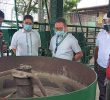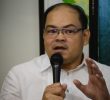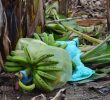“There is no product to export (once) we’ll be flooded with (ASEAN products); all the farmers will be jobless here,” said Phil Export XI executive director Conrado T. Hernaez in a press conference at Marco Polo Hotel Wednesday.
By JOHN RIZLE SALIGUMBA
Davao Today
DAVAO CITY, Philippines–Mindanao exporters fear that farmers would lose income and jobs once agricultural products from Association of Southeast Asian Nations (ASEAN) members start “flooding in” with zero import duties and tariffs.
“There is no product to export (once) we’ll be flooded with (ASEAN products); all the farmers will be jobless here,” said Phil Export XI executive director Conrado T. Hernaez in a press conference at Marco Polo Hotel Wednesday.
Hernaez was referring to the government’s plan to join the economic integration of member countries into the ASEAN Economic Community (AEC) in 2015. The move would integrate ASEAN countries’ economies into a single market to serve the demands for goods, services, labor and investments.
Romeo Montenegro, Director for Investment Promotion, International Relations and Public Affairs of the Mindanao Development Authority (MinDA) stressed that this “will hit small players” as Mindanao lacks certain facilities for trade and connectivity.
Because of these limitations, the country’s basic needs are even sourced out from other countries. “We even import our rice and 80% of our coffee comes from China, Vietnam (and other ASEAN) countries,” Montenegro pointed out.
The Philippines’ balance of trade (BOT) lags behind other Asian countries. From June last year up to June this year, the Philippines had a BOT of $117 Million, way behind Singapore’s $787M, Thailand’s $477 M, Malaysia’s $424 M and Vietnam’s $227 M.
Mindanao contributed 60% of the country’s agricultural exports in 2012 earning around $3 billion with major crops with coconut, copra surpassing top export banana. The exports were, however, affected in the aftermath of Typhoon Pablo which struck coconut and banana plantations in Davao Oriental and Compostela Valley.
Hernaez said the upcoming Mindanao Exporters Congress on July 29 to 31 would tackle these concerns.
He said one of the concerns of exporters is the high cost of transportation of goods. He floated an idea that exporters in Mindanao “will book as one” in shipping their goods.
Shipping costs are still high because of the Cabotage Law. The said law gives exclusive rights to local shipping companies to ply Philippine waters.
Montenegro also said Davao should look for more markets for banana exports aside from China. “We are looking for countries kung saan tayo makamura (where we can trade at a bargain),” he said.
Montenegro tried to look at the bright side saying Mindanao has advantage in preparation over the rest of the regions in the country because of its membership to Brunei Darussalam-Indonesia-Malaysia-
“It turned out that Mindanao is not the back door but the front door of ASEAN integration,” he said.
Montenegro added that one of the preparations made is the development of ports in the cities of Davao, General Santos and Zamboanga which are identified in the Masterplan on ASEAN Connectivity.
A RoRo (roll-on, roll-off) link between Davao-Gensan and Bitung in North Sulawesi, Indonesia is targeted to be established in October.
But farmer activist Pedro Arnado of the Kilusang Magbubukid ng Pilipinas (KMP or Farmers Movement of the Philippines) – Southern Mindanao said the lack of agrarian reform will spell worse for farmers once ASEAN integration will begin.
Arnado said farmers are hit by local cartel known as the “Binondo Seven” which “controls and manipulates rice prices.”
Of the ASEAN integration, the economic think-tank IBON Foundation said that “foreign trade and investment will only give development gains if the country is able to give judicious protection and support to local producers, as well as regulate the operations of foreign capital in the country.” (John Rizle Saligumba/davaotoday.com)
AFTA, Asean, ASEAN Crops, Asean Economic Community, Asean Trade, Land Reform, philippine export, US-ASEAN









